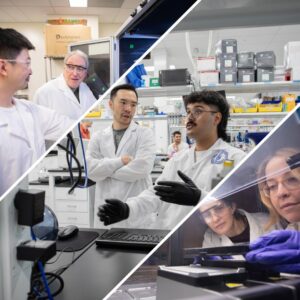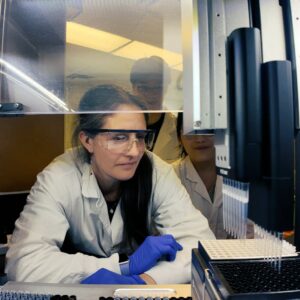Research News and Stories
Explore the latest news, stories, and groundbreaking research happening at the Institute of Biomedical Engineering. Stay updated on innovative projects, impactful discoveries, and the achievements of our talented students, faculty, and alumni shaping the future of biomedical science and engineering.
Quick Navigation
MRI technique enables long-term tracking of transplanted stem cell–derived heart cells
Dr. Keyu Zhuang (left, currently a Specially Appointed Research Fellow at Clinical Cardiovascular Research Institute at Shanghai University School of Medicine ) and Professor Hai-Ling Margaret Cheng (right) at the Institute of Biomedical Engineering at the University of Toronto have developed an MRI method to track transplanted stem-cell-derived heart cells over time, enabling scientists to monitor their survival and improve therapies for heart damage such as that caused by heart attacks (Photo: KITE Studio, Tim Fraser).
Multiple BME faculty secure CIHR project grant funding in fall 2025 competition
Several core faculty members from the Institute of Biomedical Engineering (BME) have received Project Grant funding from the Canadian Institutes of Health Research (CIHR) in the Fall 2025 competition. These awards support research across all areas of health, from early‑stage discovery to clinical application.
Researchers highlight “regenerative healing” as a holistic framework for future health innovations
A new paper by Professors Michael V. Sefton (University of Toronto) and Malcolm King and Alexandra King (University of Saskatchewan) introduces the term “regenerative healing” as a complementary, more holistic concept to regenerative medicine. The authors suggest the framework may better reflect Indigenous perspectives on health and wellness and support more inclusive conversations about emerging biomedical therapies.
Inaugural BESA 3-Minute Thesis Competition Highlights Research Excellence and Communication
The Biomedical Engineering Students Association (BESA) proudly hosted its inaugural 3-Minute Thesis (3MT) Competition, celebrating graduate research excellence and the ability to communicate complex scientific ideas to a broad audience. The competition was held over two stages, with the semi-final round taking place on November 14, 2025, followed by the final round on November 28, 2025, bringing together graduate students from across the Department of Biomedical Engineering.
U of T researchers show that fractal geometry can help kidney cells grow in a more mature form
Researchers at the Institute of Biomedical Engineering at the University of Toronto have developed a new way to grow specialized kidney cells in the lab so that they look and behave more like they do in the body.
Professor Milica Radisic featured in CBC news
Professor Milica Radisic has recently been featured in CBC News for her pioneering work in bioengineering and personalized medicine. With a focus on organ on a chip, these lab-grown models using a patient’s own cells to simulate organ function and tumor response. These devices offer a promising alternative to traditional drug testing methods, potentially improving the accuracy of cancer treatment predictions and reducing reliance on animal testing.
Dr. Noor Abu Jarad awarded a Banting Postdoctoral Fellowship
Dr. Noor Abu Jarad awarded a Banting Postdoctoral Fellowship Dr. Noor Abu Jarad has been awarded a Banting Postdoctoral Fellowship, one of Canada’s most prestigious postdoctoral awards. The Banting Postdoctoral […]
Professor Milica Radisic elected fellow of the Canadian Academy of Health Sciences
Professor Milica Radisic (BME, ChemE) has been elected a fellow of the Canadian Academy of Health Sciences (CAHS), one of Canada’s three national academies. The CAHS leverages the expertise of Canada’s leading health sciences researchers to evaluate our most urgent and complex health challenges and recommend solutions. To be named a CAHS Fellow is considered one of the highest distinctions for academics in the health sciences in Canada.
AI tool improves accuracy and efficiency in microscopy image analysis
AI tool improves accuracy and efficiency in microscopy image analysis Professor Rodrigo Fernandez-Gonzalez (pictured middle) at the University of Toronto’s Institute of Biomedical Engineering (BME) have developed a new artificial […]
Revolutionizing Heart Health: Inside the Franklin Lab at U of T
Discover how the Franklin Research Lab at the University of Toronto is transforming cardiac care through cutting-edge bioelectronic and biophotonic devices. Led by Professor Daniel Franklin, the lab is developing wearable technologies, wireless implants, and smart materials that go beyond traditional health metrics, as they bring innovative solutions from the lab to real patients.























